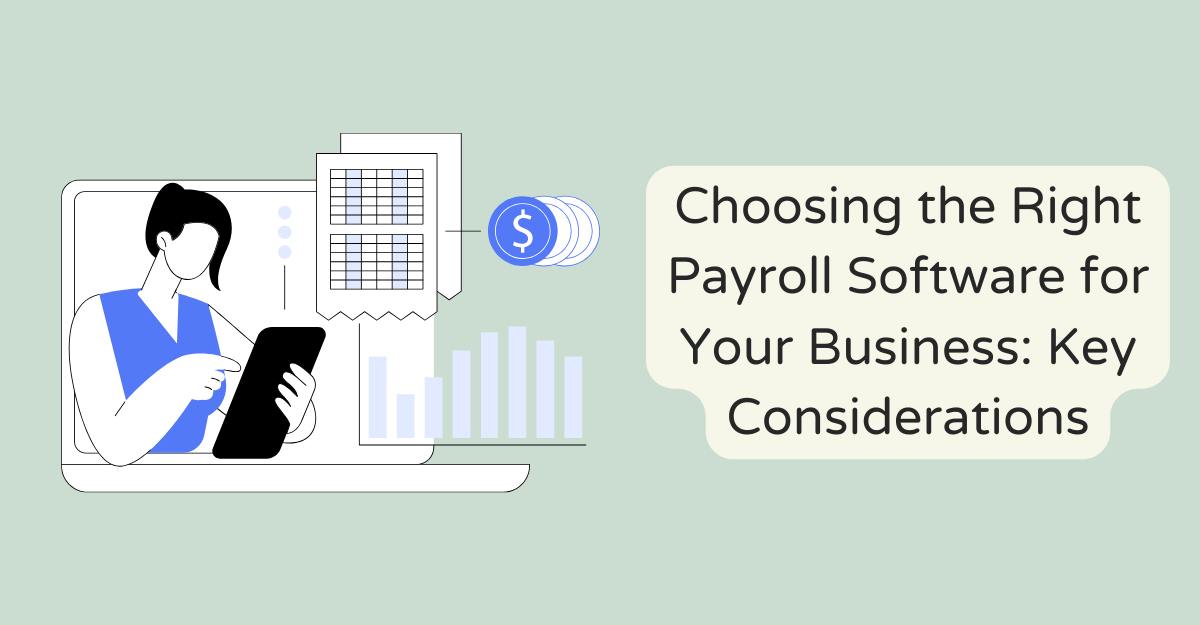
Choosing the Right Payroll Software for Your Business: Key Considerations
A payroll software is among the most critical tools that an organization can invest in. It automates the process of paying employees, ensuring accuracy and efficiency while saving time and resources.
With a market flooded with thousands of options, how do you choose the right payroll softwares for your business? Here are some key considerations to keep in mind:
1. Scalability
The concept of scalability is paramount. As your business grows, you’ll need payroll software that can adapt to your changing needs. Imagine a scenario where you double your workforce within a few years. Your chosen software must be capable of handling this growth with ease.
If it’s not scalable, you’ll face the daunting task of transferring all your payroll data to a new system. Therefore, investing in a scalable solution from the outset saves you from potential headaches and ensures a smoother expansion for your payroll operations. Always think ahead to shield your business from future obstacles.
2. Features
The features of a payroll software are the backbone of its functionality. Depending on your business’s unique needs, you’ll want to consider the following key features when choosing your payroll software:
- Tax Compliance: A comprehensive tax management feature ensures that all tax-related calculations and deductions are accurate and compliant with relevant laws and regulations.
- Time Tracking: If your business pays employees based on hours worked, a time tracking feature is crucial. It eliminates manual calculations and streamlines the process of calculating payroll.
- Direct Deposit: Consider software that allows for direct deposit to employee bank accounts. This feature ensures timely payments and saves your business from the hassle of printing and distributing physical checks.
- Reporting & Analytics: Payroll software that offers detailed reports and analytics can provide valuable insights into your business’s payroll expenses, helping you make informed financial decisions.
- Customization: Look for software that allows customization of pay schedules, deductions, and other settings to fit your specific business needs. This feature ensures flexibility in managing your payroll processes.
3. Integrations
Having a payroll software that integrates with your existing systems can save you time and increase efficiency in managing employee data. Consider the following integrations when choosing your payroll software:
- Accounting software: Integrating with accounting software allows for accurate recording of payroll expenses, making tax season easier.
- HR software: Integration with HR systems ensures seamless transfer of employee data between departments, reducing the risk of errors and duplicate data entry.
- Time tracking software: As mentioned earlier, a time tracking feature is essential in payroll management. Integration with time tracking software eliminates manual calculations and ensures accurate recording of employee hours worked.
- Banking systems: Direct deposit is a beneficial feature offered by many payroll software. Integrating with your business’s banking system allows for secure and efficient payments to your employees’ bank accounts. This feature ensures timely payments and saves your business from the hassle of printing and distributing physical checks.
4. Security
Payroll data contains sensitive information such as employee salaries, social security numbers, and banking details. It is crucial to choose a payroll software that prioritizes the security of this data. Look for the following security measures in your payroll software:
- Data encryption: Make sure that the software uses encryption to protect sensitive data from unauthorized access.
- Access controls: The software should have strict access controls, allowing only authorized personnel to view and edit employee data.
- 2FA (Two-Factor Authentication): This additional layer of security requires users to enter a unique code sent to their mobile device before gaining access to the software.
- Regular backups: Backing up your data regularly ensures that you can recover it in case of any system failures or disasters.
- Compliance: Choose a software that is compliant with data security regulations such as GDPR and HIPAA, depending on your business’s location and industry.
In addition to these features, it is essential to ensure the software you choose offer regular updates to ensure the latest security measures are in place. This will help prevent any potential cyber threats and keep your employees’ data safe.
Final Thoughts
The biggest mistake you can make is choose the first payroll software you come across. Consider all the factors mentioned in this guide and make an informed decision that best suits your business needs. Remember, payroll management is crucial for the success of any organization, so investing in a reliable and efficient software will benefit your business in the long run.





